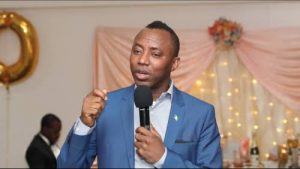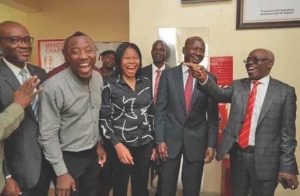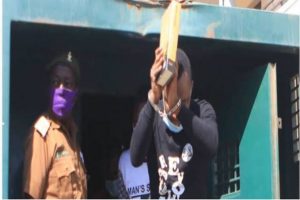For over three decades, fiery human rights activist, Omoyele Sowore, has consistently screamed at the ineptitude of government institutions and overly corrupt politicians in Nigeria.

At 12, he learned to ride a motorcycle so that he could go to the lake to go fishing for food for his entire family every morning before going to school. Born into a polygamous family with sixteen siblings, Sowore developed his passion for the media in the days of military rule in Nigeria.
According to him, the vibrant criticism from the media then towards the ruling government gave him a sense of direction of what he wanted to do.
In 1989, Sowore took part in student demonstrations protesting the conditions of an International Monetary Fund (IMF) loan of $120 million to be used for a Nigerian oil pipeline. Included among the conditions of the IMF loan, was a reduction in the number of universities in Nigeria from 28 to 5.
As the students’ union president of the University of Lagos between 1992 and 1994, he led a series of protests and demonstrations against the then military government. His agitations for a better Nigeria and utter hatred for looters of Nigeria’s wealth have seen him arrested, detained, and in many cases, brutalised.

He was also deeply involved in the demand for a democratic government taking over from military rule on June 12, 1993.
Acknowledging Sowore’s stride in the June 12 struggle in his memoir, a journalist, Niyi Babade, said, “Unannounced they came out of an unmarked grey vehicle and saw the ugly scenes then opened fire on all of us.
I spent some quality time in my resting place (in the) the gutter till I heard the singing voices of the students of the University of Lagos led by Yele Sowore heading to (Moshood) Abiola’s house. I crawled out of my hiding and tried to get an exclusive shot when the hoodlums among the students attacked me and wanted to confiscate my camera but with the heroic effort of Sowore I was spared and allowed to join them as one of the hoodlums and a journalist which then gave me unlimited access to exclusive footage of the day till we got to Moshood Kashimawo Olawale (MKO) Abiola’s house.”
After being expelled twice for political reasons and because of his student activism, Sowore graduated in 1994, got his final results in May 1995. He had his National Youth Service Corps programme in Yola, Adamawa State, from 1995-1996 but was never given a discharge certificate to date.
“It was purely political. The first time I was expelled was because of my participation in the Babangida Must Go/anti-SAP (Structural Adjustment Programme) protests that grounded Nigeria.

The second time was after the military authorities targeted the student leadership by empowering and employing the services of cult gangs on campuses against us. It was at the height of the June 12 protests against the regime of General Sani Abacha,” he said in an interview in 2016.
The activist fled Nigeria to the United States in 1999 for urgent medical treatment of his vital organs.
Upon relocating to the US, Sowore continued with his activism by starting Sahara Reporters, a citizen journalism platform that continues to expose corruption.
Omoyele Sowore was an active participant of the Pro-Democracy Movement in the early 90s.
Speaking on how he founded Sahara Reporters, he said, “The idea was inspired by citizen journalism that emerged out of anti-WTO (World Trade Organisation) protests in Seattle, Washington the US. I was totally taken by the fact that ordinary citizens could tell the riveting and powerful stories of an unfolding event that had been ignored by the mainstream media. I started thinking really hard about replicating that experience for Nigerians and Africans, but with a particular focus on corruption.
“Before establishing Sahara Reporters I had tried a few collaborations with others, but those efforts went nowhere.
What collaborations and with who? My first collaboration was with Jonathan Elendu, founder of Elendureports.com. I also sought to pitch my investigative reports to several Nigerian newspapers. One or two newspapers picked a report here and there, but the papers were mostly not interested, or they were too scared to pick up the explosive reporting I was sending to them.
“I’ve always been a communicator, as a matter of fact. As a student union leader at the University of Lagos, I served 27,000 students. To lead that many students demand a great deal of flair for mass communication. And we did a lot of communicating. In my foray into social media, I’d say the Internet provided an opportunity to reach vastly more people. I started with the emergence of this great technology that has disrupted the status quo.
“In some ways, I am by nature somebody who questions and challenges and disrupts unfair orders or systems. So everything came together very well. I also realised that when people are far away from home, living in a variety of foreign countries, they frequently yearn to know what’s happening at home. In a sense, I started by acting as a reporter to and for those kinds of people.”

Sowore was arrested by men of the Department of State Services, a domestic intelligence agency with a history of repression on 3 August, 2019 ahead of a planned nationwide #RevolutionNow protest.
He was moved to the agency’s headquarters in Abuja where he was illegally detained for 144 days despite different court orders issued for his release.
The DSS accused him of baseless crimes like money laundering and that he was plotting to overthrow President Muhammadu Buhari even though it failed to produce any evidence to substantiate its claim.
His detention was declared as arbitrary and illegal under international law by the United Nations Working Group on arbitrary detention, under the United Nations Commission on Human Rights (UNCHR).
The UN group lambasted the Nigerian government and asked it to stop the unlawful prosecution of the activist for his attempts to organise a peaceful protest in August of 2019.
It pointed out that the charges against him were quite vaguely defined and that such vagueness seems to have been used to make an ordinary exercise of freedom sound like a threat to national security and a terrorist act.
The group said, “The source reports that, in the early hours of the morning of August 3, 2019, two days to the planned protests, Mr Sowore was arrested at his hotel and held for days without being formally charged. After one of his family members granted an interview with Democracy Now calling for his release, the authorities immediately denied Mr Sowore access to his family for over two months.
“The Department of State Services publicly stated that Mr Sowore’s ‘call for a revolution’ presented a threat of insurrection that warranted his arrest. The source notes that the public widely knew that Mr Sowore’s call for a peaceful pro-democracy protest was not a call for undemocratic political insurrection, let alone a violent upheaval. There was no warrant for Mr Sowore’s arrest, and he was detained in the custody of the Department for five days without being brought before a judge.
“On August 6, 2019, the Department of State Services sought an ex parte order from the Federal High Court in Abuja to detain Mr Sowore for an additional 90 days, to conduct investigations, without formally charging him. On August 8, 2019, the court granted the request to extend his detention, under section 27 (1) of the Terrorism Prevention Act, 2013, but permitting the Department to detain Mr Sowore for 45 more days.
“The source states that the request was granted under an overly vague provision of the antiterrorism law from 2013. The court refused to hear the motion to quash the 45-day detention order until September 21, 2019, the day the detention order expired.
“Mr Sowore was detained for a total of 48 days without formal charges filed against him. On September 20, 2019, seven criminal charges were brought against him, including the crime of cyberstalking and for allegedly insulting the President of Nigeria online. Others were treasonable felonies and money-laundering. To date, no evidence of any wrongdoing for those extremely serious charges has been produced by the authorities.
“The source notes that the authorities rely solely on Mr Sowore’s lawful public statements and free exercise of his right to freedom of expression.”
The group also expressed that by cutting off access to his family and implementing severe and disproportionate bail conditions, the Nigerian government had violated Sowore’s right to a fair trial.
It also called on the Nigerian government to conduct a full and independent investigation into the circumstances surrounding Sowore’s detention, to release Sowore from his bail conditions, and to take appropriate measures against those responsible for the violation of his rights.
“In the light of the preceding, the Working Group renders the following opinion: The deprivation of liberty of Omoyele Sowore, being in contravention of articles 9 and 11 (2) of the Universal Declaration of Human Rights and articles 2, 3, 9, 14 and 26 of the International Covenant on Civil and Political Rights, is arbitrary and falls within categories I, II, III, and V.
“The Working Group requests the Government of Nigeria to take the steps necessary to remedy the situation of Mr Sowore without delay and to bring it into conformity with the relevant international norms, including those set out in the Universal Declaration of Human Rights and the International Covenant on Civil and Political Rights.
“The Working Group considers that taking into account all the circumstances of the case, the appropriate remedy would be to unconditionally release Mr Sowore immediately and accord him an enforceable right to compensation and other reparations, in accordance with international law.
In the current context of the global coronavirus disease (COVID-19) pandemic and the threat that it poses in places of detention, the Working Group calls upon the government to take urgent action to ensure the immediate, unconditional release of Mr Sowore.
“The Working Group requests the government to disseminate the present opinion through all available means and as widely as possible,” it noted.
When asked in an interview in 2018 maybe there were things he thought he could have done better, the activist said, “Most of my adult life has been spent in the service of Nigeria – as a student and youth activist, pro-democracy fighter, and citizen journalist. I have been harassed, detained, tortured, maligned, and harassed for my views. I have been victimised and expelled for fighting against injustice. I have had my bank accounts closed, and my fundraising platforms shut down.
“I have chosen to walk down a career path that is dedicated to advancing the Nigerian nation. It has been a hard and sometimes lonely path. But I have had fulfillment in being a part of the movement that has pushed our nation forward towards democratic and accountable governance.
“Given the option to start all over again – I will make the same choice. Service to this nation is a cause that I have dedicated my life to. I am now offering myself to Nigerians to elect me to serve them as the leader of this great nation. I’ll regret if the opportunity to do right by our people is missed once again.”
No doubt, Sowore represents different things to different people depending on one’s social, economic and political leaning. To the corrupt politicians, the ruling class and their paid and unpaid apologists, he is a tool in the hands of the opposition – a wild, unsubstantiated and indefensible charge that has yet to be proven with cogent and verifiable evidence.
Sahara Reporters